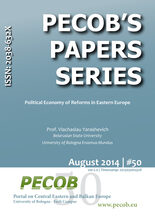and Balkan Europe
by IECOB & AIS Università di Bologna

Political Economy of Reforms in Eastern Europe
August 2014 | #50
by: Viachaslau Yarashevich
pp: 33
ISSN: 2038-632X

Abstract
Reforms in Eastern Europe, launched in the early 1990s, have touched upon all spheres of former communist societies, but their greatest impact has been on politics and economies. It is the complex nature of these reforms which makes political economy the most relevant tool for understanding such a phenomenon as post-communism. Above all, it should reveal the concept of reforms, their principles and driving forces. Then it can help with identifying what went wrong and what can be done to make post-communist transformation more successful in the long term. In other words, political economy approach to post-communism should amount to a critical interpretation of links between politics and economics in Eastern Europe, formed by various public interests. The latter essentially reflect the views of major social groups with regard to how economy should be run so that public wealth is maximised and fairly distributed. And whereas the configuration of public interests during post-communism was shaped by many factors, it seems that the most important among them was a failure of political elites to balance the interests of major social groups in a fair and efficient way. As time has passed, it proved a serious challenge for all post-communist countries, especially those in the former Soviet Union. It is argued that this was caused by the wrong capitalist model implemented in post-communism. Notably, rather than embracing rather crude and idealised forms of neoliberalism, East European countries should have adopted more socially-oriented alternatives which were put forward by progressive academics yet in the early 1990s and may be still aspired to by majorities across the region.
Table of contents
Abstract
Introduction
Public interests, social groups and class
Political economy of neoliberalism as the mainstream of post-communist discourse
Alternative political economy approaches to post-communism
What kind of capitalism needed for post-communism in the globalised world?
Bibliography
Author
Download the paper
PECOB: Portal on Central Eastern and Balkan Europe - University of Bologna - 1, S. Giovanni Bosco - Faenza - Italy
Chiudi la versione stampabile della pagina e ritorna al sito.
 Download the full paper!
Download the full paper!